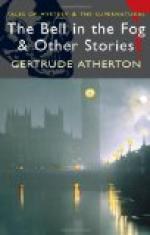Orth gasped. It was the first time he had ever heard a native American use the term middle-class with a personal application. For the moment, he forgot the child. His analytical mind raked in the new specimen. He questioned, and learned that the woman’s husband had kept a hat store in Rome, New York; that her boys were clerks, her girls in stores, or type-writing. They kept her and little Blanche—who had come after her other children were well grown—in comfort; and they were all very happy together. The boys broke out, occasionally; but, on the whole, were the best in the world, and her girls were worthy of far better than they had. All were robust, except Blanche. “She coming so late, when I was no longer young, makes her delicate,” she remarked, with a slight blush, the signal of her chaste Americanism; “but I guess she’ll get along all right. She couldn’t have better care if she was a queen’s child.”
Orth, who had gratefully consumed the bread and milk, rose. “Is that really all you can tell me?” he asked.
“That’s all,” replied the daughter of the house. “And you couldn’t pry open father’s mouth.”
Orth shook hands cordially with all of them, for he could be charming when he chose. He offered to escort the little girl back to her playmates in the wood, and she took prompt possession of his hand. As he was leaving, he turned suddenly to Mrs. Root. “Why did you call her Blanche?” he asked.
“She was so white and dainty, she just looked it.”
Orth took the next train for London, and from Lord Teignmouth obtained the address of the aunt who lived on the family traditions, and a cordial note of introduction to her. He then spent an hour anticipating, in a toy shop, the whims and pleasures of a child—an incident of paternity which his book-children had not inspired. He bought the finest doll, piano, French dishes, cooking apparatus, and playhouse in the shop, and signed a check for thirty pounds with a sensation of positive rapture. Then he took the train for Lancashire, where the Lady Mildred Mortlake lived in another ancestral home.
Possibly there are few imaginative writers who have not a leaning, secret or avowed, to the occult. The creative gift is in very close relationship with the Great Force behind the universe; for aught we know, may be an atom thereof. It is not strange, therefore, that the lesser and closer of the unseen forces should send their vibrations to it occasionally; or, at all events, that the imagination should incline its ear to the most mysterious and picturesque of all beliefs. Orth frankly dallied with the old dogma. He formulated no personal faith of any sort, but his creative faculty, that ego within an ego, had made more than one excursion into the invisible and brought back literary treasure.
The Lady Mildred received with sweetness and warmth the generous contributor to the family sieve, and listened with fluttering interest to all he had not told the world—she had read the book—and to the strange, Americanized sequel.




